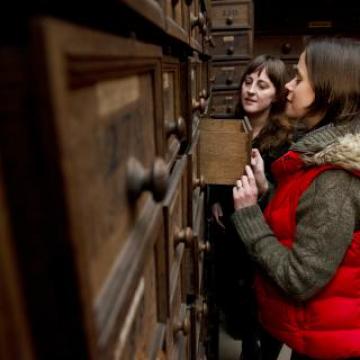Global and Comparative Feminisms in the Long Nineteenth Century
In January 2017 Marilyn Booth (Khalid bin Abdullah Al Saud Professor for the Study of the Contemporary Arab World, Oriental Institute) and Kathryn Gleadle (Professor of Gender and Women’s History, Faculty of History) organised two highly successful events on ‘Global and Comparative Feminisms in the Long Nineteenth Century’, funded by TORCH alongside support from the Centre for Gender, Identity and Subjectivity and the Centre for Global History. The aim was to provide an opportunity to explore how best to categorise the projects of female empowerment that began to crystallise and cluster across the globe during the long nineteenth century. The first event, held on the 23 January at 5pm, was a well-received lecture given by internationally renowned specialist of gender and empire, Professor Antoinette Burton, from Illinois University. The talk was entitled ‘The Scorpion’s Lash: Gender and the Making of an Imperial Anthropocene in Victorian Afghanistan’ and took place at the Blue Boar lecture theatre at Christ Church College.
The following day, a lively and much oversubscribed workshop was held at St Luke’s Chapel, TORCH. It attracted a diverse audience of undergraduates, postgraduates, and early career fellows as well as established academics. Recent scholarship has been enormously fruitful in plotting the global networks and transnational links which motivated many first wave feminists. This project is indebted to this scholarship and has drawn extensively on its themes and insights. However, Booth and Gleadle wished to stimulate debate further by switching the lens more decisively to a tightly-focused comparative methodological approach. As such, the workshop constituted of two comparative sessions: ‘Caribbean and the Middle East’ and ‘India and USA/UK’. The first of these consisted of two papers. The contribution of Imaobong Umoren (Pembroke-TORCH Career Development Fellow in Women in the Humanities) was entitled ‘Daughters of Africa: Black Feminism and Pan-Africanism in the Caribbean and US’, and she was followed by Marilyn Booth, speaking on ‘Ancient Greeks and Modern Gladstones: “Europe”, Histories of Patriarchy, and Feminist Recognitions in 1890s Egypt’. The panel was chaired by Professor Elleke Boehmer (one of the leading scholars of world literature and TORCH Director) and the respondent was Jaclyn Granick (Newton International Fellow and an expert in Jewish internationalism). Umoren’s paper foregrounded lived experience, whilst Booth’s was more focused on interrogating intellectual debates. Together the two papers provoked much discussion about the changing use of terms such as ‘emancipation’ through to ‘rights’ across this era. In so doing, workshop participants considered the role of modernity in shaping subjectivities and the complex role education played in the lives of the individuals and institutions under discussion. The second panel was also composed of two papers. Sumita Mukherjee from the Global Feminisms cluster at the University of Bristol spoke on, ‘Indian Women, Suffrage, and Changing Definitions of International Feminism’, and Ruth Percy (St Hilda’s) delivered a paper on, ‘Class and Feminism at Turn of the Century: Britain and America’, the subject of her forthcoming book. The panel was chaired by Lucy Delap (Cambridge, an expert in international feminisms) and the respondent was Kerrie Thornhill (Deputy Director of International Gender Studies Centre). Here, a key theme was the variety of semantic and political motivations historical subjects might have for rejecting the term “feminist”. As such, discussions revolved particularly around the implications for the way we, as historians, should conceptualise the objectives of these early campaigners seeking to dramatically reform women’s position.
The workshop ended with a roundtable discussion chaired by Kathryn Gleadle and featured formal contributions from Erica Charters (Director of the Centre for Global History) and Antoinette Burton. Within this final session, participants debated themes relating to the difficulties posed by translation; the need to break down and problematise historical categories such as ‘Europe’ and ‘modern’, and how to conceptualise and work with the various spatial imaginaries of the global. All involved were grateful to TORCH for facilitating these events, which provided a unique opportunity for scholars (in Oxford, but also from universities elsewhere in Britain and North America) to debate these critical areas of historical enquiry. They are themes which continue to have substantial relevance within contemporary debates over politics, feminism, and ‘the global’.
Plans are currently developing across the UK for centenary celebrations to mark the granting of the parliamentary vote to (many) British women in 1918. This workshop established the vital importance of other, less British-centric counter-narratives which fed into such legislative successes. Remembering the diversity of this tradition will be at the heart of the workshop’s published outcomes.
Dr Marilyn Booth
Professor Kathryn Gleadale



